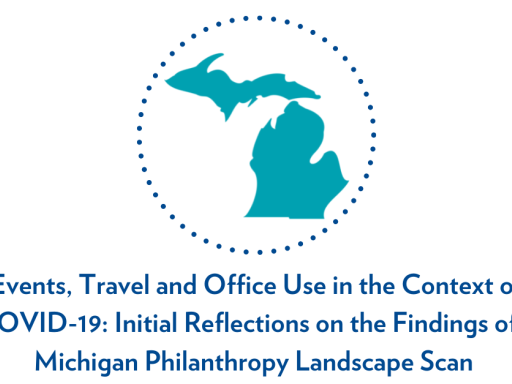As the COVID-19 pandemic continues, organizations are learning, adapting and reimagining the return to workplaces and event travel. And across our community of philanthropy, conversations have been taking place on what it means to put equity and inclusion at the center of these conversations and decisions, and how we can lean in to ways of working that are grounded in our values and a commitment to collaboration.
CMF invited all members to respond to an online survey asking where organizations and individuals were related to these conversations and decisions on events, travel and office use to ultimately create a deeper shared understanding across our community of philanthropy on these important issues of peer engagement and connection.
Here, we provide initial (preliminary) reflections on the data focused on organization-wide decisions and planning. In a follow-up piece we will explore the impact of those decisions on individuals as we unpack the survey data on personal readiness. In our next report we’ll also highlight resources that survey respondents have shared that are helping their teams to support mental health, team building, safety protocol planning and more.
It is important to note that a survey such as this is a snapshot, a moment in time. In the context of COVID-19, individual perceptions can change significantly over time. If we administered the same survey two months earlier or two months later and the same group responded, the answers may look notably different.
It is also important to consider who responded to the survey when reviewing the data. While the access link was available to all CMF members, the 139 individuals who responded self-selected to participate, and their perspectives do not necessarily represent the opinions of all. We recommend readers review the data on respondents by organization type and region to further understand the context of these findings.
It is clear in reviewing the data there are no easy answers, there is no singular approach and one size does not fit all. Decisions are that much more complex in the constantly evolving situation this pandemic has presented over the past two years, which will continue to evolve over the year ahead.
Whether an organization is making decisions about travel, event participation and office use for a staff of three people or 35, there are many factors to consider, including:
• The inequities of the pandemic’s impact, especially on people of color, understanding that data in Michigan clearly indicates disparities in hospitalizations and deaths from COVID-19.
• Continued health and safety concerns of the pandemic, especially for those who are immuno-compromised, recognizing that we may not know the health challenges our colleagues are facing.
• The anticipated cyclical nature of the pandemic, with state health officials predicting further periodic surges.
• Responsibilities for caregiving that many individuals have been managing at home.
• Trauma from the loss of friends, family and community members.
• The impact on mental health that for some can result from long-term isolation, while for others, can result from the stress of being among larger groups of people in a pandemic.
• Resources that individuals are expected to have to work remotely effectively, and resources that are assumed with an expectation for commuting to work.
• How organizations can retain current staff and attract great candidates for open positions in an environment where companies are increasingly creating flexible work environments.
• Creating quality spaces for group creativity and collaboration, as well as opportunities to build a sense of team, especially with staff hired during the pandemic.
• What it means to local partners and grantees to work on site and be in community, and how our presence supports local businesses.
• What we gain by attending events such as conferences and sector convenings in person while putting key health and safety protocols in place.
Kyle Caldwell, president and CEO of CMF, shares that he has maintained a continuing philosophy of “people first” in decision making throughout COVID-19.
“When we are responsible for people’s safety, that is the stake in the ground. Ensuring the most vulnerable can participate has to factor into our planning. Putting equity at the center of those decisions means planning with universal design in mind – thinking about the diversity of experiences and situations that our members, our staff and our communities are experiencing, and planning for the most accessible and safe pathways to engage.”
As CMF prepares for its first larger-scale in-person convenings of staff and members since the onset of the pandemic, Caldwell notes that risk mitigation will be key while balancing individuals’ desires to reconnect. “Along with our members, we recently heard from the state’s chief epidemiologist and chief medial executive about what we know about COVID-19 and what to expect in the future," Caldwell said. "They provided guidance on how to balance safety and the desire many have to 'reemerge.' We also have polled our members on their comfort levels. Based on the data we will continue to work closely with state and local officials to identify health and safety protocols that can best support safer environments to gather. We are incredibly excited to bring the CMF community of philanthropy together in person this year – for the CMF 50th Annual Conference, and more. Equitable decision making for health and safety and will continue to be our guide in planning.”
We invite you to take a look at the initial findings of the survey and look forward to sharing more on the survey findings with you soon. In the meantime, if you have any questions please connect with Bridget McGuiggan, chief strategy officer at CMF.
Want more?
Explore the initial survey findings.
